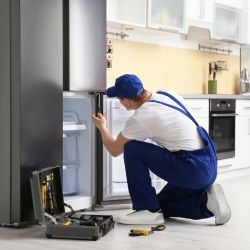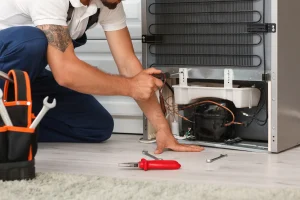A malfunctioning refrigerator can make it challenging to keep your food fresh and safe to eat. If your fridge is not cooling properly, there could be several reasons why. Here’s a checklist to help you diagnose the issue and potentially fix it yourself, or know when it’s time to call in a professional technician.
One of the most common reasons why a refrigerator may not be cooling properly is due to incorrect temperature settings. Check that the thermostat is set correctly and adjusted to the appropriate temperature for your fridge model. If it’s not, adjust it accordingly and wait a few hours to see if this solves the issue. Additionally, make sure that the vents inside the fridge are not blocked by food or other items as this can restrict airflow and cause cooling problems. By ensuring that your temperature settings are correct, you can prevent additional issues from occurring with your fridge and keep your food fresh for longer.
BOOK A REPAIR NOW!
MY REFRIGERATOR NOT COOLING
Fridge maintenance
My refrigerator not cooling
-
Keep your fridge clean: Often clean your fridge to prevent the accumulation of dirt, dust, and food particles. Use a mild detergent and warm water to clean the interior and exterior of the fridge.
-
Keep the temperature consistent: Make certain that the temperature inside your fridge is consistent. Ideally, the temperature should be between 35 and 38 degrees Fahrenheit. Any temperature above 40 degrees Fahrenheit can lead to food spoilage.
-
Don’t overload the fridge: Avoid overloading your fridge with food. Overpacking your fridge can cause the appliance to work harder and consume more energy, which can shorten its lifespan.
-
Keep the fridge well-ventilated: Ensure that the fridge is well-ventilated and has enough space to circulate air around it. Avoid placing the fridge in direct sunlight or near a heat source.
-
Check the door seals: Check the door seals regularly to make sure they are tight and in good condition. Loose or damaged seals can cause air leaks and cause the fridge to work harder than it needs to.
-
Keep the condenser coils clean: The condenser coils at the back of the fridge should be cleaned at least twice a year to prevent dust and dirt from accumulating. This will help the fridge work more efficiently and prolong its lifespan.
-
Use the fridge wisely: Use your fridge wisely by avoiding leaving the door open for too long and not putting hot food in it. Hot food can cause the fridge to work harder and consume more energy.
Smart appliance centre
14 Blackburn road Durban North
4051
031 562 0666

